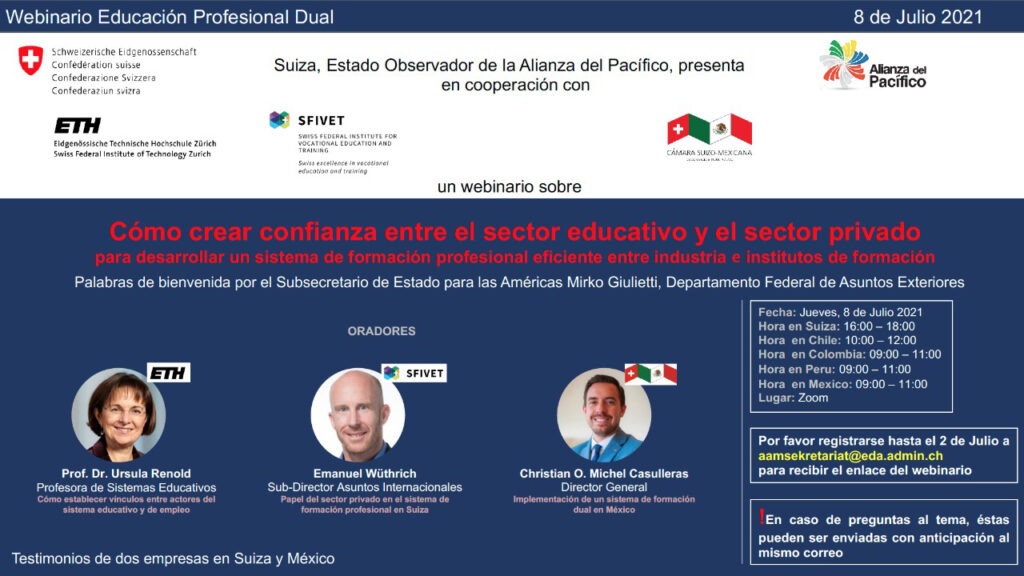July 8, 2021.- In order to further strengthen the ties between the education system and the productive system in the region and discuss the importance of professional training that involves the private business world and the public education and employment systems in the countries of the Pacific Alliance (PA), the webinar “How to build trust between the education sector and the private sector to develop an efficient professional training system between industry and training institutes” was organized by the Technical Group of Education (GTE by its acronym in Spanish) of the PA and Switzerland, in its capacity as Observer State.
The Pacific Alliance has worked, through the GTE, to strengthen the Technical Professional Education of the four countries, with the understanding that these actions help develop human capital and boost the productivity and competitiveness of the economies, as well as contribute to overcoming socioeconomic inequality and achieve the objectives of the region’s social inclusion policies.
Why could Switzerland be an example for PA countries? This country has one of the most competitive and innovative economies, thanks to its education system and has a long tradition in the field of vocational education and training, also known as “dual education”. At the end of compulsory school, two-thirds of Swiss young people choose the vocational training path, where there are at least 400 career options.
These professions are the result of the high demand for different skills required by the private sector, which is actively and continuously involved with the curricula for the education sector. Thus, dual education is oriented towards the real and current demand of the economy and corresponds to the available jobs, to the extent that there is a low percentage of youth unemployment and few “neither…nor” (“neither study nor work”) in Switzerland.
Learn more about vocational training in Switzerland here.
The event was attended by Mirko Giulietti, Undersecretary of State for the Americas of the Swiss Federal Department of Foreign Affairs; Ursula Renold, Professor of Educational Systems at the Swiss Federal Institute of Technology (ETH) in Zurich; Emanuel Wüthrich, Deputy Director International Affairs of the Swiss Federal Institute for Vocational Education and Training (SFIVET), Christian Michel Casulleras, General Director of the Swiss-Mexican Chamber, and Santiago Fernández de Soto, Head of the Office of Cooperation and International Affairs of the Ministry of Education of Colombia, on behalf of the GTE of the PA, in addition to the testimony of companies that have adopted the dual model in Mexico, such as Zurich Seguros, Firmenich and Schlinder.
The Coordinator of the GTE, who gave the closing remarks of the webinar, highlighted this event as an initial milestone in the strengthening of Dual Education initiatives in each of the PA countries. He also emphasized that it is expected to continue with the support of the Swiss Government in future spaces for learning, exchange and reflection on the progress of this topic in the member countries.


